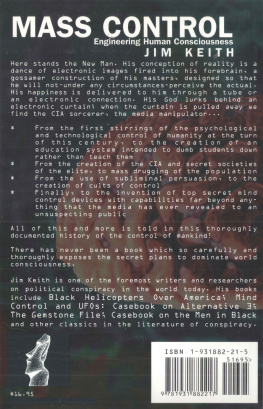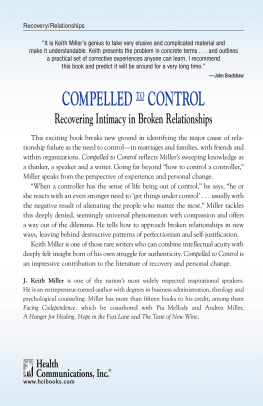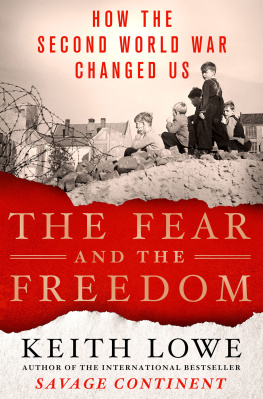Jim Keith - Mass Control
Here you can read online Jim Keith - Mass Control full text of the book (entire story) in english for free. Download pdf and epub, get meaning, cover and reviews about this ebook. year: 2019, genre: Politics. Description of the work, (preface) as well as reviews are available. Best literature library LitArk.com created for fans of good reading and offers a wide selection of genres:
Romance novel
Science fiction
Adventure
Detective
Science
History
Home and family
Prose
Art
Politics
Computer
Non-fiction
Religion
Business
Children
Humor
Choose a favorite category and find really read worthwhile books. Enjoy immersion in the world of imagination, feel the emotions of the characters or learn something new for yourself, make an fascinating discovery.
Mass Control: summary, description and annotation
We offer to read an annotation, description, summary or preface (depends on what the author of the book "Mass Control" wrote himself). If you haven't found the necessary information about the book — write in the comments, we will try to find it.
Mass Control — read online for free the complete book (whole text) full work
Below is the text of the book, divided by pages. System saving the place of the last page read, allows you to conveniently read the book "Mass Control" online for free, without having to search again every time where you left off. Put a bookmark, and you can go to the page where you finished reading at any time.
Font size:
Interval:
Bookmark:

MASS CONTROL:
Engineering
Human
Consciousness
Jim Keith
Mass Control: Engineering Human Consciousness
Copyright 1999, 2003 by Jim Keith
All rights reserved
Published by
Adventures Unlimited Press
Kempton, Illinois 60946 USA
www.adventuresunlimitedpress.com
ISBN 1-931882-21-5
10 9 8 7 6 5 4 3
For the Inhabitants of Planet 9
After the publication of my book Mind Control, World Control , I was contacted by many persons with new information on the subject of human control, both researchers in the field as well as some persons who believe that they have been the subject of abuse by intelligence and other agencies. The necessity for an update and an expansion of my earlier research became apparent. This book is the result.
As always, I was greatly assisted by my personal friends, network of fellow researchers, and readership. Special thanks are due my family who continue to tolerate my odd hours and bohemian brain-style, and to my publishers, to whom I owe much gratitude.
What luck for rulers that men do not think. Adolf Hitler
Contents
Chapter 1
Origins of Control
Agents of the worlds elite have been long engaged in a war on the populace of Earth. Greed is the motivation for this war, a greed so pervasive that it encompasses the planet and all of the beings on it, but in recent times a philosophy has been used to justify that greed. It is the philosophy of mass control, that ultimately aims at dictating every aspect of human lifeeven remolding mans perception of reality and himself.
Although the lust for control can be discerned since the beginning of recorded history, a nexus of particular importance arose in Germany in the latter half of the 19th century. As the country increased in military and industrial might, becoming the strongest power in Europe, a revolution simultaneously took place in German philosophic and scientific thought that paradoxically would spread through the world to create positive technological change as well as to birth innumerable toxic children. According to one source:
The sudden change from relative political weakness to world power and from economic insecurity to prosperity proved to be a great strain on the German character and public life. The spread of materialistic philosophy of life was world-wide in this age, and the idolatry of power was not confined to Germany, but its corrosive effect was particularly strong in a country that was not inured to power.
One aspect of this transformation, this idolatry of power was a negative transformation of the psychological sciences. In the late 19th century, earlier more humanistic approaches to understanding mankind were replaced by a scientific philosophy that would be employed less as a measure for the understanding of man than as a justification for a new feudalism and a mechanism of pure control.
The materialist overhauling of psychology was in great part ushered in by the work of the German psychologist Wilhelm Maximilian Wundt. Wundt was a professor of philosophy at the University of Leipzig, and in 1875 established the worlds first psychological laboratory there, a move that would eventually turn the world of more humanistic-oriented psychology on its head. Interesting, but Wundts grandfather is documented as having been a member of the Illuminati secret society, making it not unreasonable to imagine that herr professor may also have been a member of that group.
Wundt, in reflection of a powerful materialistic groundswell in German thought that began with Schopenhauer at the beginning of the 19th century and that was to be later epitomized by Karl Marx, rejected in cavalier fashion the notion that man might have a soul or deeper significance than the merely physical, that he was in fact anything more than an animal. Following this line of reasoning, an approach that came to be known in psychology as Structuralism, Wundt insisted that all psychological studies should depend entirely on the study of body reactions. The truth of man, Wundt insisted, could be determined solely through mechanistic means: measurement, analysis, and dissection of bodies. After Wundt had thoroughly infused the psychological sciences with his materialist approach, many scientistsand the members of the ruling class that employed thembelieved that they were justified in treating human beings as if they were pieces of meat, and as an overall plan of action, proceeded to do so.
The materialist psychological doctrine spread rapidly with at least twenty-four laboratories established by Wundts students between the years 1883 and 1893, with more of the Germans acolytes fanning out to infiltrate related fields, such as education. Wundts materialistic approach would infect the thinking of most of the influential psychologists, psychiatrists, educators, and social planners who would follow in the 20th century.
One man who marched to Wundts dirge was the Russian, Ivan Petrovich Pavlov. Pavlov conducted a wide-ranging research into techniques of control, primarily using dogs for his experimentation. In the now-famous experiment, Pavlov fed his dogs, stimulating salivation, while at the same time ringing a bell. After doing this many times, Pavlov was able to stimulate salivation in reaction to the sound of the bell alone. Other of Pavlovs experiments involved rewarding dogs with petting, or punishing them with pain. Using these kinds of approaches, Pavlov developed his theory of the conditioned reflex, demonstrating that animals are motivated by patterns of conditioned response, and that conditioning can be artificially induced. The results of Pavlovs experiments did not escape the social planners of his day, nor those who would follow.
Notes:
GermanyHistory Since 1850, Encyclopedia Americana . New York: Americana Corporation, 1963 Lionni, Paolo. The Leipzig Connection . Sheridan, Oregon: Delphian Press, 1988; GermanyHistory Since 1850; Wood, Samuel and Ellen Green. The World of Psychology , third edition, at www.prenticehall.ca/wood ; Weiten, Wayne. A New Science is Born: The Contributions of Wundt and Hall, Psychology: Themes and Variations . 3rd edition, at http://psychology.wadworth.com/bookChapter 2
Perfecting Inhumanity
A time-dishonored approach to the manipulation of man kind is through the philosophy and techniques of eugenics. This is the attempted perfecting of humanity through genetic means: selective breeding, sterilization, biological manipulation, and even murder for those considered unfit.
The study of eugenics has its beginning in Germany, sometime after the mid-19th century mark, stimulated by volkish concerns for Aryan racial purity. Rudolf Virchow, pathologist and politician, began a study of national ethnic statistics in 1871, convinced that the majority of Germans would prove to be of relatively pure Nordic descent. The results of his studies proved otherwise. According to Virchow, the obvious solution was to set about Nordicizing the debased German stock.
The popularity of eugenics theories was given a jump-start in England by Francis Galton, a cousin of Charles Darwin. In 1869 Galton published his book Hereditary Genius , that Cornell University anthropology professor Davydd Greenwood has called an impassioned brief for hereditary aristocracy that became the first modern document of the modern eugenics movement. Galton was the man who launched the nature vs. nurture debate that quietly rages today, arguing for the domination of innate rather than acquired human abilities. It was Galtons opinion that the human race could be improved by selective breeding and the extermination of the unfit. Galton once said that he hoped that eugenics would become the religion of the future." In the latter part of the century, with endeavors like the Human Genome Project that seeks to map the entirety of human DNA, his hope seems to be moving toward fulfillment.
Font size:
Interval:
Bookmark:
Similar books «Mass Control»
Look at similar books to Mass Control. We have selected literature similar in name and meaning in the hope of providing readers with more options to find new, interesting, not yet read works.
Discussion, reviews of the book Mass Control and just readers' own opinions. Leave your comments, write what you think about the work, its meaning or the main characters. Specify what exactly you liked and what you didn't like, and why you think so.













